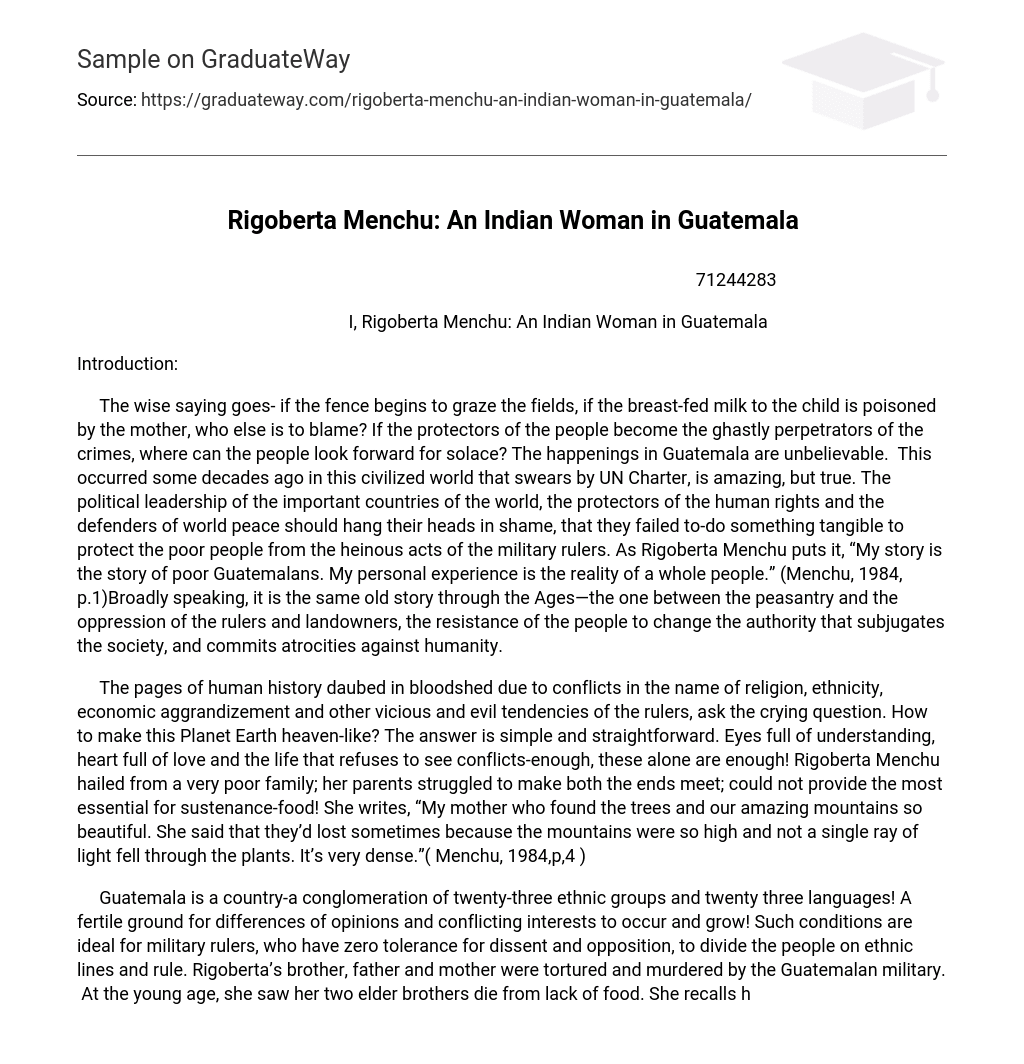The wise saying goes- if the fence begins to graze the fields, if the breast-fed milk to the child is poisoned by the mother, who else is to blame? If the protectors of the people become the ghastly perpetrators of the crimes, where can the people look forward for solace? The happenings in Guatemala are unbelievable. This occurred some decades ago in this civilized world that swears by UN Charter, is amazing, but true.
The political leadership of the important countries of the world, the protectors of the human rights and the defenders of world peace should hang their heads in shame, that they failed to-do something tangible to protect the poor people from the heinous acts of the military rulers. As Rigoberta Menchu puts it, “My story is the story of poor Guatemalans. My personal experience is the reality of a whole people.” (Menchu, 1984, p.1)Broadly speaking, it is the same old story through the Ages—the one between the peasantry and the oppression of the rulers and landowners, the resistance of the people to change the authority that subjugates the society, and commits atrocities against humanity.
The pages of human history daubed in bloodshed due to conflicts in the name of religion, ethnicity, economic aggrandizement and other vicious and evil tendencies of the rulers, ask the crying question. How to make this Planet Earth heaven-like? The answer is simple and straightforward. Eyes full of understanding, heart full of love and the life that refuses to see conflicts-enough, these alone are enough! Rigoberta Menchu hailed from a very poor family; her parents struggled to make both the ends meet; could not provide the most essential for sustenance-food! She writes, “My mother who found the trees and our amazing mountains so beautiful. She said that they’d lost sometimes because the mountains were so high and not a single ray of light fell through the plants. It’s very dense.”( Menchu, 1984,p,4 )
Guatemala is a country-a conglomeration of twenty-three ethnic groups and twenty three languages! A fertile ground for differences of opinions and conflicting interests to occur and grow! Such conditions are ideal for military rulers, who have zero tolerance for dissent and opposition, to divide the people on ethnic lines and rule. Rigoberta’s brother, father and mother were tortured and murdered by the Guatemalan military. At the young age, she saw her two elder brothers die from lack of food. She recalls how the Indian families suffered from mal-nutrition. Most of them failed to make the age of fifteen. In facing such grim experiences, anyone will become cynical.
But Rigoberta sustained her fighting spirit. If one reads the story of the capture of her mother by the military junta, worst possible dishonor to her body, torture, how they disfigured it part by part and allowed the mutilated body to rot in the jungle and how she died in terrible agony— in comparison, the narrations of the holocaust of Jews in Germany relate like the kindergarten stuff!
She lived through the bloodiest civil war that engulfed the country and the bloodthirsty military killed about 200,000 people of its own people. Though she had fire in her heart to serve for the cause of the poor people, academically she had nothing great to her credit. Her biography when it was published, took her name to the international scene. The plight of indigenous people attracted the attention of the world. She was awarded the Nobel Peace Prize in 1992. She was also criticized for her Marxist leanings as for the style of narrations contained in her book.
“I, Rigoberta Menchu,” is the record of history Guatemala, in the critical period of its existence; its contents speak about the collective voice of the famous characteristics of Mayan culture; it speaks about the horrible and systematic destruction of over 400 villages; when even the human right organizations paid lukewarm response to the brutalities the military junta, this young woman had the courage to fight against their ruthless style of administration; this is the record of how she represented all poor Guatemalans; how a deeply pious and religious woman with the universal outlook was dubbed as a Marxist; how and why this woman considered Bible as the weapon for the liberation of the poor and how she argued that the highest level of spirituality is conducive for the greatest good of the poor people.
Conclusion
Rigoberta is an author by her own right; she has not reached the pedestal of Nobel Prize with anybody’s mercy. She may not be an author with the sophistication of the authors of the metropolitan cities of the western world who are made even bigger by the literary agents and by the publishing house. She grew up in a poor, rustic environment, and narrated the story in the style dear to her heart. Anyone with a human heart must read this book.
The one with the research brain may read it for the second time, and even visit the Guatemala and arrive at own conclusions. To be amidst the people and inspire them to fight the military oppressors is a great achievement. To her, spiritual and political beliefs are the alternative beats of the same heart. She has proved this by her actions and without the trace of fundamentalism, which is the hallmark of theocratic state. For those interested in Latin American history, peasant cultures, human rights, political science and sociology, this is an excellent guide. This book serves as the reminder that autocratic and military rules are the worst thing that can happen to a country and eternal vigilance is needed by the people to protect and preserve democracy.





